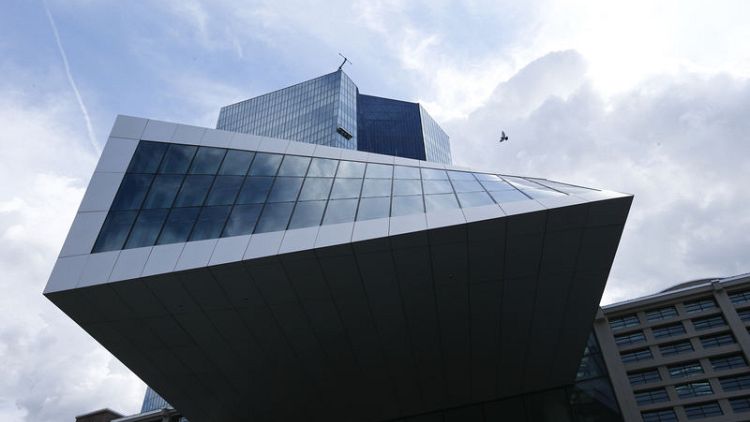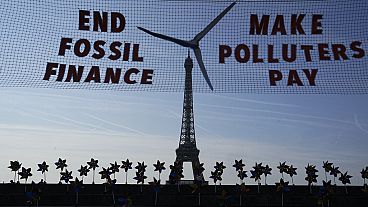By Dhara Ranasinghe, Ritvik Carvalho and Tommy Wilkes
LONDON (Reuters) - Two months after ending its massive stimulus scheme, the European Central Bank faces growing pressure to address how it will protect the euro zone economy from a protracted slowdown.
Thursday's policy meeting, news conference, and updated economic forecasts, could set the tone for potential policy changes.
"There is room today, at the minimum, to have a discussion about what they can do to improve the macro environment," said Florian Ielpo, head of macroeconomic research, cross-asset solutions at Unigestion.
Here are some key questions for markets.
1. Can we expect details about a fresh round of cheap loans to banks?
The ECB is preparing to give banks more cheap, long-term funding and for investors, details are key. Barclays expects a new package will have less generous terms than the last, with a smaller size and variable interest rate.
The ECB's Benoit Coeure took markets by surprise last month when he said the idea was being discussed. Data last week showing corporate lending growth in the bloc plunged in January, gives policymakers another reason to help out banks.
An announcement on these loans, known as Long Term Refinancing Operations (LTROs) or the more targeted TLTROs, could come this week, say some economists, although others think the ECB will want more time to assess the economic climate.
With previous TLTROs starting to mature in mid-2020, the ECB may want to act around June to help banks avoid potential liquidity shortages.
"Not only will the ECB discuss LTROs, but they need to drop a hint that some sort of extension is coming or markets will be disappointed," said Pictet Wealth Management strategist Frederik Ducrozet. He expects a decision in April and a new scheme to be implemented in June.
ECB mulls fresh round of TLTROs: https://tmsnrt.rs/2EEY23E
2. By how much will the ECB cut its economic forecasts?
With momentum stalled in powerhouse economy Germany and Italy in recession, the ECB is all but certain to slash growth and inflation forecasts.
Economists say markets should pay particular attention to projections for 2020 as the best indication of how concerned the bank is about growth. Some recent indicators point to a pick-up later this year.
ABN AMRO analysts said the ECB's forecasts for core inflation, which excludes energy and food prices, are too high.
A key gauge of investors' long-term inflation expectations also falls well short of the ECB's near-2 percent target but is off recent lows, standing at 1.50 percent.
ECB's forecasts for the euro zone, December 2018: https://tmsnrt.rs/2BYgC51
3. Could the ECB change its guidance that rates are on hold through the summer?
Unlikely, judging by recent commentary. The ECB's future chief economist Philip Lane last week took a relaxed view of the economic slowdown and its policy implications.
And German Bundesbank President Jens Weidmann -- a possible successor to ECB chief Mario Draghi later this year -- said the ECB need not formally delay a planned rate hike.
Investors have already pushed out rate hike expectations to mid-2020.
Jefferies economist Marchel Alexandrovich said a surprise tweak could not be ruled out. "It may be an opportunity for the ECB to signal that markets are not wrong to push out the timing of a first rate rise," he said.
More of German yield curve sub-zero as investors push back rate-hike expectations: https://tmsnrt.rs/2BYRzPv
4. How worried is the ECB by the growing U.S./EU trade tensions?
Trade tensions between the United States and the European Union are a major concern for ECB policymakers, given potential disruption to the euro zone's huge exporting industries should the dispute worsen. U.S. President Donald Trump warned in February of tariffs on European car imports if a trade deal was not reached. The European Commission wants to start negotiations, but France has expressed reservations. Tariffs would hurt carmakers already grappling with an emissions scandal, including Germany's Volkswagen, Daimler and BMW and complicate the ECB's job of reviving the euro zone economy. Draghi has warned that unilateral decisions on trade policy are dangerous and threaten economic confidence.
Trade tensions hit European car stocks: https://tmsnrt.rs/2BW3FsA
5. How is uncertainty over Draghi's successor impacting policymaking?
ECB President Mario Draghi, whose term expires in October, is unlikely to comment on speculation about his successor but the subject is likely to come up, since uncertainty over who will next lead the central bank can affect policymaking.
The ECB does not have an input and a decision is unlikely until after European Parliament elections in May, although manoeuvring for the job appears to be underway.
The green light for Germany's cabinet for Bundesbank head Weidmann to serve a second eight-year term keeps him in the mix alongside French counterpart Francois Villeroy de Galhau.
Weidmann has often challenged the ECB's ultra-easy monetary policy stance, irking fellow policymakers.
For investors in banking stocks, long hurt by the ECB's negative interest rates, a hawkish shift would be welcome, and news of Weidmann's second term at the Bundesbank sparked a rally in euro zone bank stocks.
European bank stocks: waiting for a hawk? - https://tmsnrt.rs/2BWh97C
(Reporting by Dhara Ranasinghe and Tommy Wilkes; Graphics by Ritvik Carvalho; Editing by Catherine Evans)



